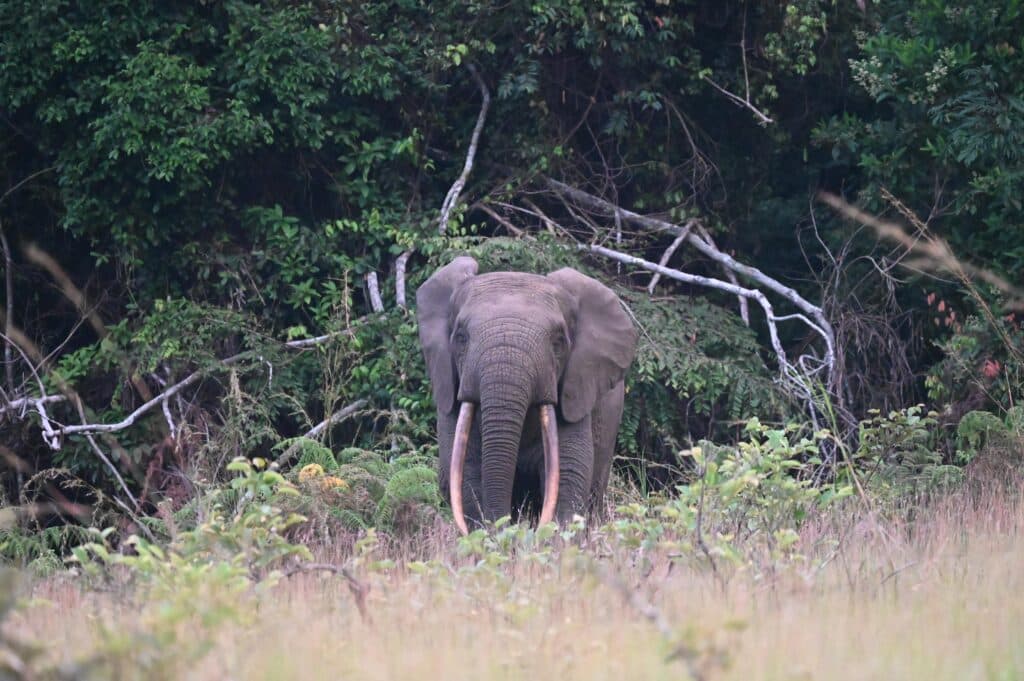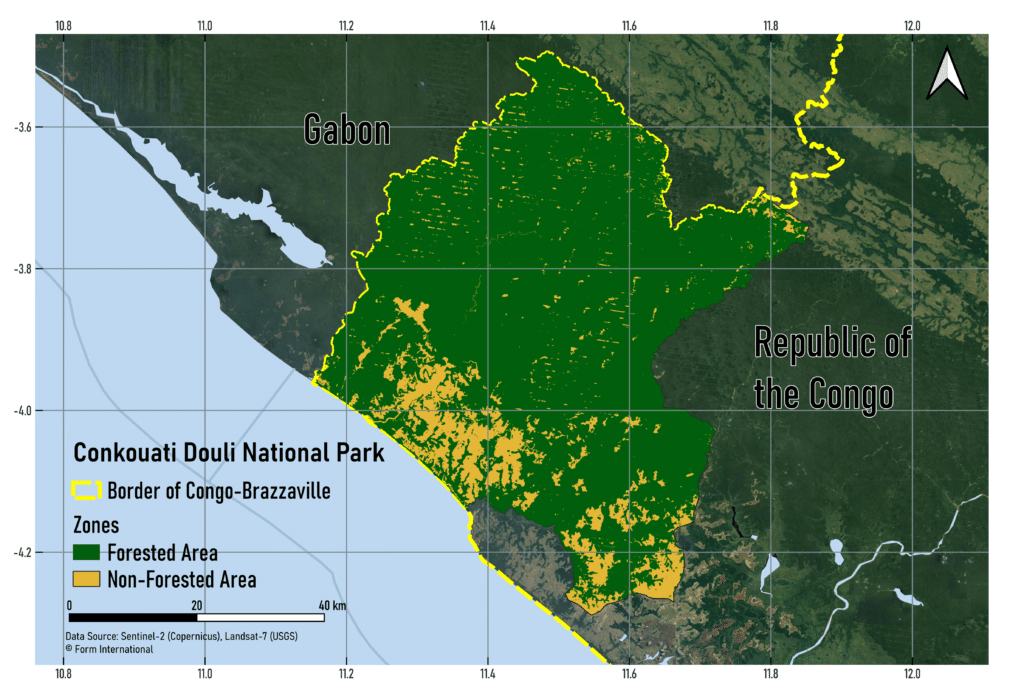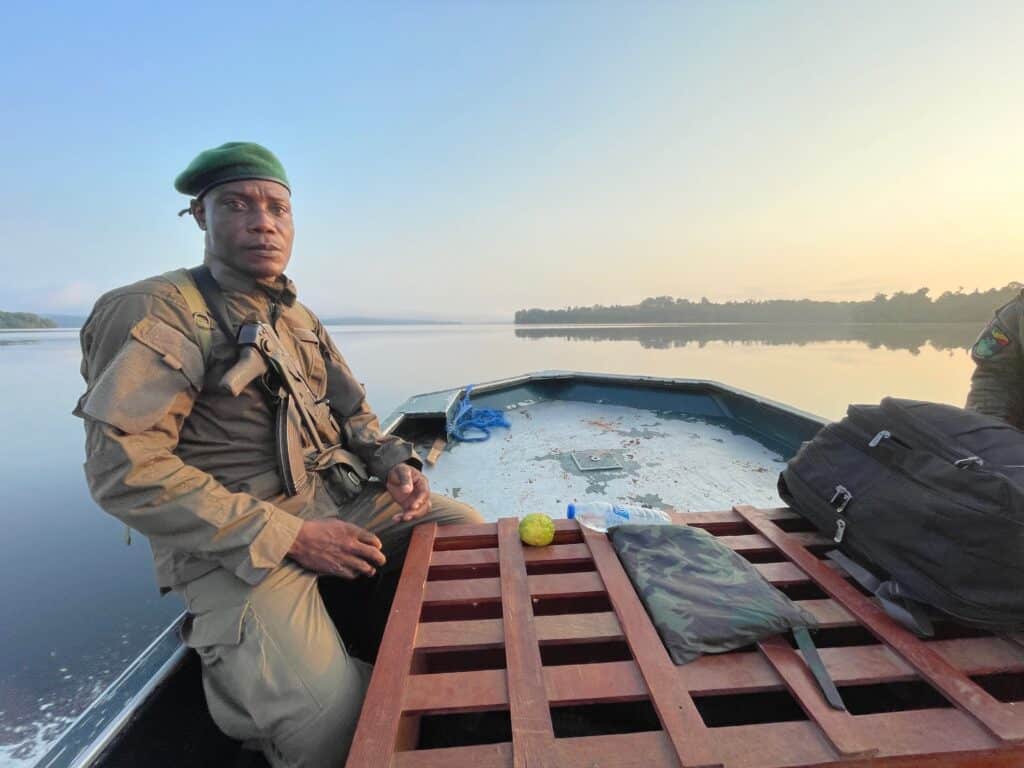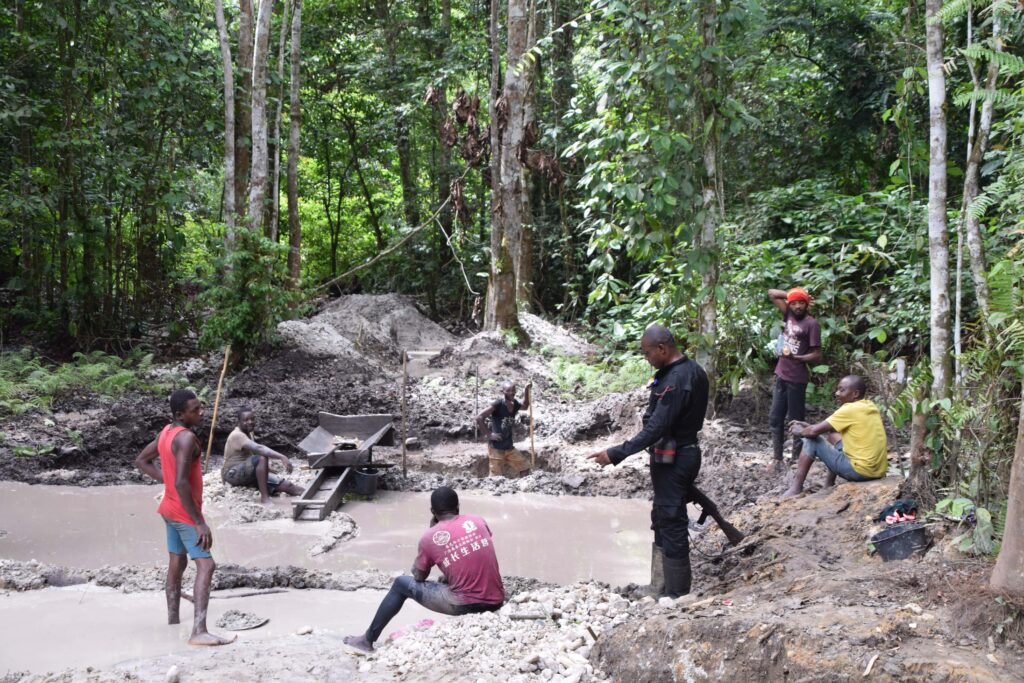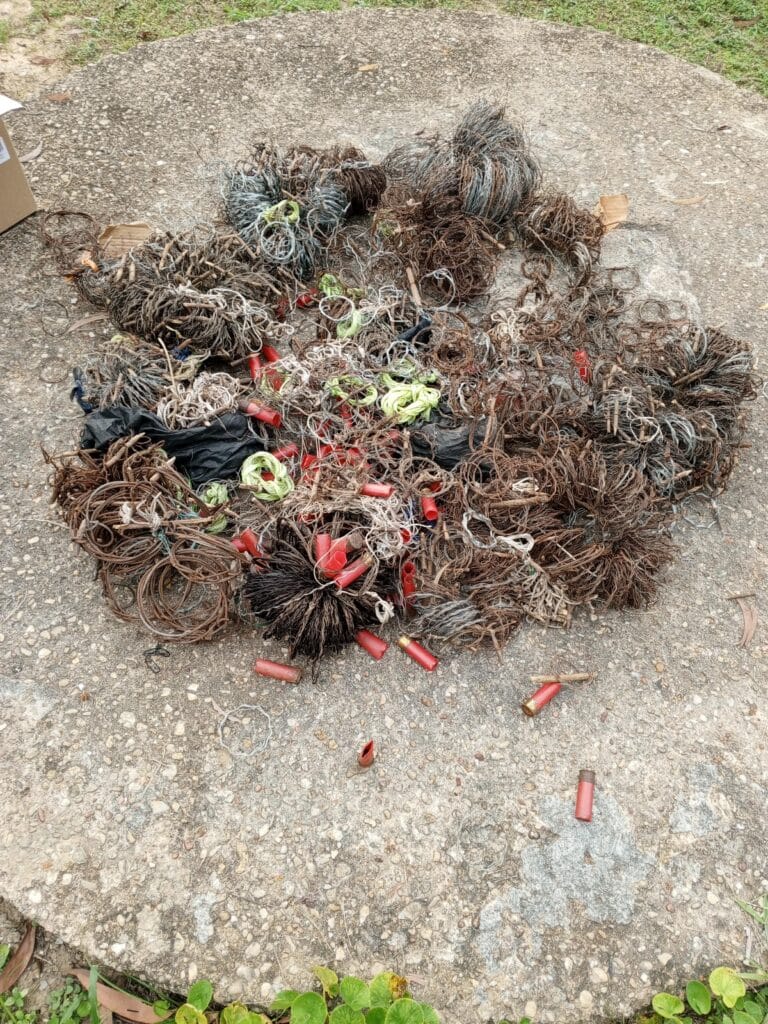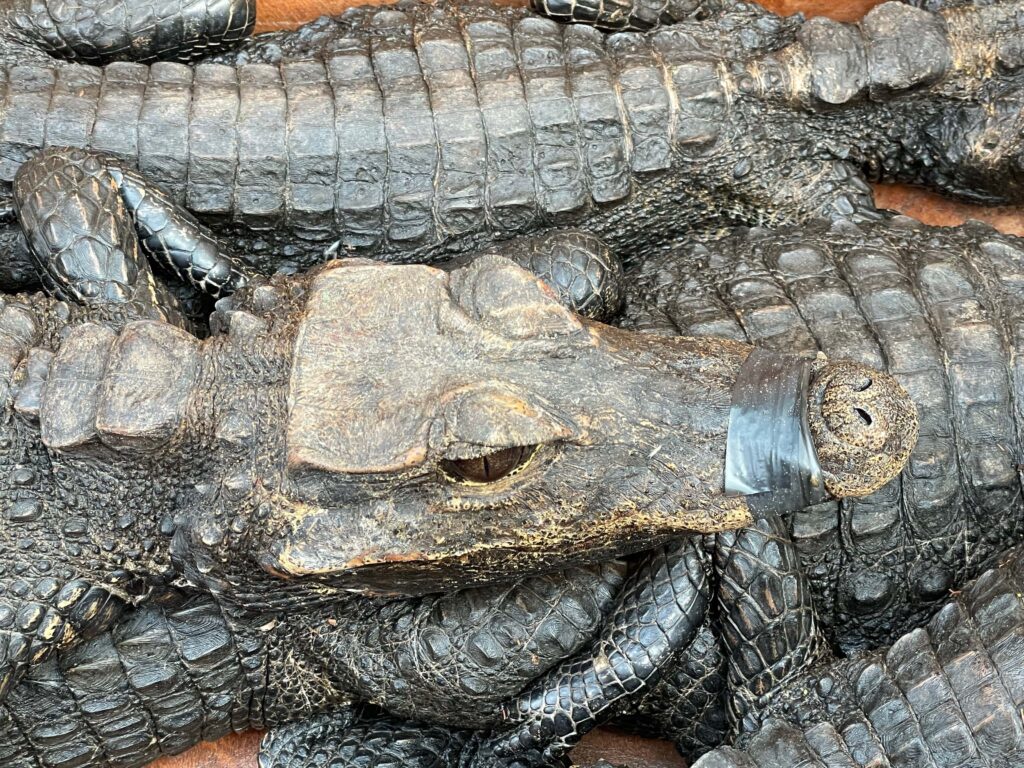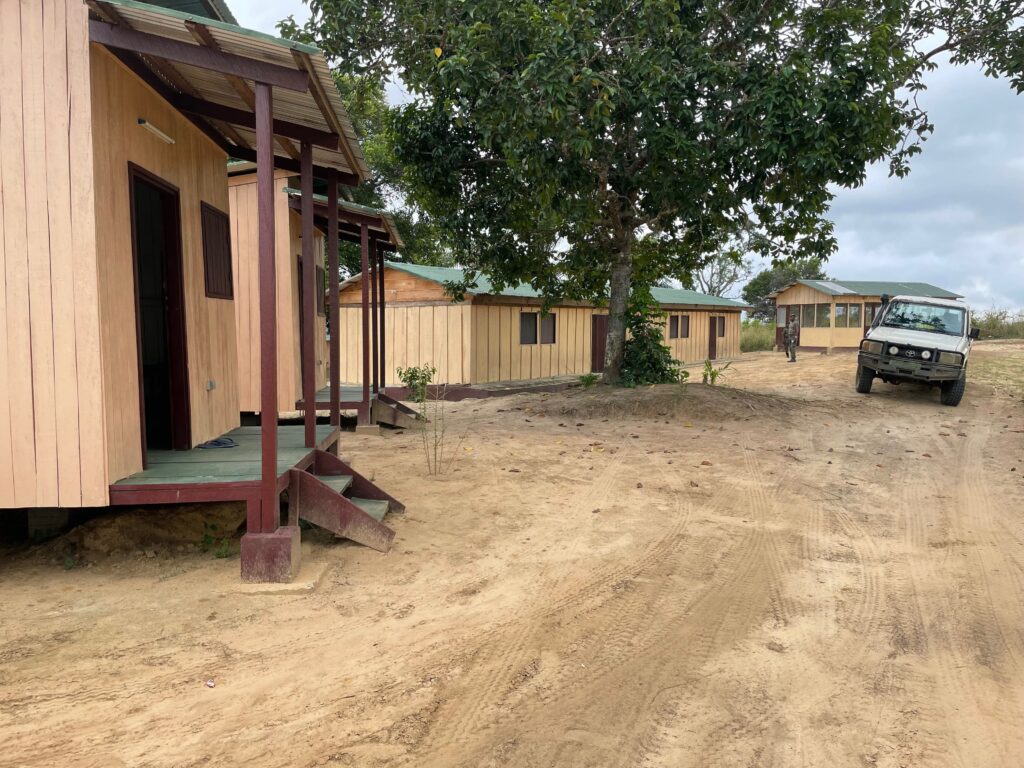A forest elephant bull calmly emerges from the cover of the forest, to graze in the evening light in the savanna of Conkouati-Douli National Park in the Republic of Congo.
French conservation organization Noé, which assumed management of Conkouati in 2021, is seeing increasing signs that wildlife is beginning to feel less threatened, and this encounter with an extremely relaxed bull was a highlight of Dr. Chris Thouless’ recent visit to this ECF supported project. Located aside the Atlantic coast in the south-west of the Republic of Congo, Conkouati is both a marine and terrestrial protected area, a biodiverse site with an unusual mosaic of lagoons, beaches, mangroves, coastal forests and lakes, giving way to dense rainforest intersected by the meandering Noumbi River.
With such diverse habitats, Conkouati is home to a rich array of species, including approximately 1,000 forest elephants, the country’s only coastal elephant population. It also provides a refuge for western lowland gorillas and chimpanzees. Marine species include humpback whales, dolphin, and multiple turtle species; the Conkouati coastline forms part of one of the most important leatherback turtle breeding areas on Earth. Justifiably described as a ‘jewel of biodiversity’ by Arnaud Greth, the President of Noé, Conkouati is also home to around 7,000 people, and sustainable resource use by these communities is allowed.
The 20-year partnership agreement signed between Congo’s Ministry of Water and Forests and Noé in 2021 could not have come too soon. With limited management since 2018, the park was in disarray, with uncontrolled illegal settlements, mining, logging, fishing and poaching, and escalating human-elephant conflict.
Despite these huge challenges, in the last two years the park management has begun to re-establish effective law enforcement. The ECF has funded infrastructure development, ranger equipment and uniforms, salaries, and plugged an emergency funding gap in 2022. With this and other donor support, Noé has been able to develop a stronger law enforcement presence with a small but well-equipped and trained ranger team. With 27 rangers now patrolling regularly on foot and by boat, they are starting to stem the flow of illegally sourced bushmeat, timber, gold and other resources being stripped from the park.
Chris’s visit in May 2023 was an opportunity to see first-hand the impact of ECF funding, the ongoing challenges, and Noe’s vision for the future.The only way to access the dense forest in the core of the park is using the rivers. The ECF has funded outboard engines to allow the relaunch of river patrols, essential to address illegal activities in the heart of the park.
River patrolling can be extremely difficult, with huge fallen trees obstructing the waterway, and unpredictable fluctuating water levels. Traveling even a moderate distance upstream can be very time consuming, often involving strenuous efforts to lift boats and equipment over and around obstacles.
Illegal mining of cassiterite (tin ore) and gold poses a significant problem in Conkouati. Conducted by both small-scale artisanal miners and larger scale commercial operators, it leads to habitat loss and fragmentation as land is cleared and access roads created, and an increase in human disturbance and associated illegal activities such as bushmeat extraction. Shutting down small scale mining operations, removing miners from the park and stopping them re-establishing themselves, is an achievable challenge. However, today around 800 people are currently mining in the park scattered over several camps, which is too large a group of people to easily evict from the park. Noé has put control posts upstream and downstream from the mining sites, to limit miners’ movements and activities, as state authorities work towards securing permanent closure.
Addressing the bushmeat trade is also a priority for the Conkouati team, and brings its own challenges. Although communities living legally in Conkouati are allowed to hunt bushmeat for subsistence purposes, bushmeat extraction for commercial purposes is not allowed. Snaring of animals for bushmeat can cause a huge amount of suffering and can have devastating consequences on wildlife populations when conducted at an industrial scale.
Rangers are working hard to control this trade through patrolling for snares and checking vehicles for carcasses, striking a balance between respecting the rights of local communities and thwarting the activities of criminals engaged in this deadly trade.
One of the main target species for poachers is the endangered dwarf crocodile, which is only found in Central Africa. During Chris’s trip, he took part in the release of dwarf crocodiles that had been confiscated by park rangers, transporting them by boat to a remote release site. Although small they have a tendency to snap, not something to risk when sharing a confined space with 20 of them! The insulation tape is an undignified but harmless damage limitation tool which is removed before release.
Human-elephant conflict is an escalating issue and one that the Conkouati team is determined to mitigate. Villagers within the eco-development zone of the park grow cassava and other crops in fields near their villages. Because of the mosaic nature of crop fields and natural habitat, it can be difficult for elephants to tell when they are coming into a farm.
Villagers currently resort to attempting to chase elephants away with loud noises, but Noé is planning more effective methods and will be trialing techniques outlined in Save the Elephants’ HEC toolbox, including chili and ‘smelly elephant repellent’ fences, as well as electric fencing.
A very well-timed event during Chris’s visit to Conkouati was the arrival of ECF-funded uniforms and equipment.
The ECF has also funded improvements and additions to ranger accommodation, still in progress, including enhancements to existing buildings, further dormitories, a canteen, shower areas and senior staff accommodation.
Noé is also developing positive connections with communities within and around Conkouati. Supporting socio-economic improvements, including sustainable local enterprise and job creation, assimilating local people into park governance, and improved access to water, healthcare and education, is a core aim of the Conkouati team.
Knowing that our donors’ money is being used in an efficient and impactful manner in Conkouati, thought now turns to the future. Noé has a clear vision, to ensure the future of the elephants and other wildlife of Conkouati, and the communities sharing this space with them. We look forward to continuing to support Noé to achieve this, with your donations making this ongoing work possible.
